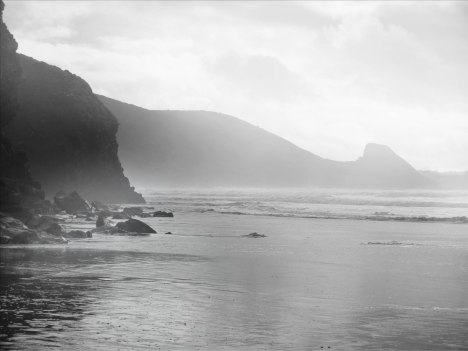
It’s a truly dismal day in West Wales and thankfully only two days off the midwinter solstice. Not to be put off, I checked the tide table, donned my hat, gloves, and waterproofs, and headed for Newgale beach. Thin rain turned to thick fog – a sea fret rolled in and obscured the horizon and the clifftops. Pale houses clung to the side of the dark hill above the road that crosses the pebble bank that keeps the sea from the valley, and, at the far end of the beach, Ricket’s Head reached into the fog and was consumed by it. Alone on the sand with only the sound of the sea and the edges of my sight dreaming into mist, it was easy to imagine monsters in the rocks and dragons sleeping on the headlands or lurking in the ocean depths. I could almost see long-extinct birds winging their way above my head, and every polished and rounded, multi-coloured stone could be a dinosaur egg.
I got to wondering about ancient myths and legends, the Welsh are very good at these though they’re not alone in that, take the Greeks and Romans for example, and whether it was days such as today that shaped these mythical beasts into fantastical stories and cemented them into our folklore.
It’s only one step further to envisage a need for protection from these ravening beasts of our primeval fears and make some of them into gods. Take the sea – Today it rolled in from an unseen distance shrouded in mist and mystery. What lurked out there? What dangers might there be? What protection might be needed? And what if the dragon on the clifftop woke? Amulets, tokens, and superstitions were rife. Gods needed placating, lest they unleashed their undoubted power in anger, for wasn’t the sea sometimes angry, didn’t the sky sometimes explode with thunder and split itself with lightning? Didn’t the sun threaten to disappear forever at the midwinter solstice? How did pagan man explain such things? The gods are angry seems a perfectly reasonable explanation. That sacrifices had to be made to placate them seems obvious.
Take another step and add man’s need for controlling his own destiny, his need for power over others to the mix and you can understand how medicine men, witches and warlocks, seers, soothsayers, prophets, witchdoctors, and priests came into being. How easy it must have been for them to place themselves above the common man as a go-between or mouthpiece of the gods. How easy it would be to play on man’s fears and insecurities and exploit them.
You can see what I’m working up to here – as an atheist, I can explain religion in these terms. I can understand how it came about, and how it took hold and became so deeply rooted worldwide in its many forms. Don’t get me wrong, faith is a wonderful thing and is deeply comforting to many people, when we don’t fight over it. It just isn’t for me.
But it’s a subject that, despite my best intent, always seems to creep into my writing. In ‘The Silence of the Stones’, a Welsh mystery, Alana prays to her small gods – the ‘god of knackered Minis’ being but one, and she wonders about Rhiannon’s use for Sowila, the rune symbol for the sun god.
In ‘Touching the Wire’, a tale of the women of Auschwitz, Walt turns to Greek goddesses after he feels his Catholic god has deserted him, and we see women of all faiths coming together to celebrate Christmas in a death camp – such is faith’s power.
In my historical trilogy, ‘For Their Country’s Good’, a tale of convict transportation to the colonies, we see religion in it’s most bigoted form – a control mechanism to keep common folk, especially women, firmly in their place.
But it’s in ‘Where Hope Dares’, a dystopian tale that touches on the second coming, where different religions – Christian, tribal, and pagan – are brought into stark relief and spark a war of ideals based on myth, prophecy, misunderstanding, bigotry, and brutality.
Maybe it’s because I find the evolution of ideas and their power fascinating and thought-provoking that I write them into my stories. If you’d like to see more and find out why the gods are angry and here be dragons take a look at:
https://rebeccabrynblog.wordpress.com/about-my-novels/ – for a free preview
or to purchase:
http://mybook.to/SilenceoftheStones
http://mybook.to/TouchingtheWire
http://mybook.to/OnDifferentShores (Book One of For Their Country’s Good)
http://getbook.at/WhereHopeDares
Brilliantly evocative. You made me shiver, and the only place I’ve been is to the local school to watch Cinderella and Rockerfella. Nothing stays the same. 🙂
LikeLiked by 2 people
I can just imagine this on Newgale with the mist rolling in and the ocean god roiling beneath the waves!
LikeLiked by 3 people
It was a very mystical walk. Lovely.
LikeLiked by 3 people
I think I prefer the beach on a wet day. I get it almost to myself.
LikeLiked by 2 people
I like it when it rains. “Him indoors” is convinced he’ll shrink – always has been – so I get to walk the dog by the river when nobody else does. Very peaceful, except the Wear is treacherous and can rise ten feet in 30 minutes. Paws in to paddle to swimming in a strong current, except I carry food and she’s greedy.
LikeLiked by 1 person
A very evocative, and thoughtful, piece. I’m going to share it on my site.
LikeLiked by 2 people
The mood of the sea changes constantly and my mood with it. As animals sharing this planet, we are deeply wired to sea, sun, moon and stars – at least, I am. Indeed one of my future novel ideas would be called Daughters of the Moon.
LikeLike